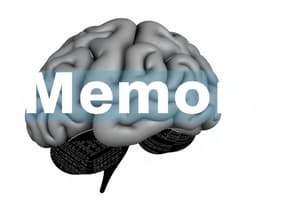Podcast
Questions and Answers
What is the standard model of memory based on?
What is the standard model of memory based on?
- A computer metaphor (correct)
- A neural network metaphor
- A cognitive development metaphor
- A library metaphor
What is the term for the visual sensory register?
What is the term for the visual sensory register?
- Iconic storage (correct)
- Linguistic storage
- Echoic storage
- Motoric storage
What is the normal range of information people can hold in short-term memory?
What is the normal range of information people can hold in short-term memory?
- Five to nine items (correct)
- Three to five items
- Seven to ten items
- Eight to twelve items
What is the term for information stored in words?
What is the term for information stored in words?
What is the process of connecting new information to material which is already known?
What is the process of connecting new information to material which is already known?
What is the effect that causes people to remember the beginning and end of a list more easily than the middle?
What is the effect that causes people to remember the beginning and end of a list more easily than the middle?
What are the three stores of memory in the modern view?
What are the three stores of memory in the modern view?
What did William James argue that primary memory is?
What did William James argue that primary memory is?
How are words stored phonologically?
How are words stored phonologically?
Which region of the brain is believed to be involved in high-level cognitive functions?
Which region of the brain is believed to be involved in high-level cognitive functions?
What type of memory refers to how-to knowledge?
What type of memory refers to how-to knowledge?
What is the function of the visual-spatial sketchpad?
What is the function of the visual-spatial sketchpad?
How does the phonological store process words?
How does the phonological store process words?
What is chunking?
What is chunking?
What are the two kinds of information people store?
What are the two kinds of information people store?
What is memory expressed in behaviour that does not require conscious recollection?
What is memory expressed in behaviour that does not require conscious recollection?
What is prospective memory for?
What is prospective memory for?
What is the role of the medial temporal region (especially the hippocampus) in memory consolidation?
What is the role of the medial temporal region (especially the hippocampus) in memory consolidation?
What is the most effective way to learn 300 foreign language vocabulary words?
What is the most effective way to learn 300 foreign language vocabulary words?
What is a characteristic of an item that makes it easier to remember?
What is a characteristic of an item that makes it easier to remember?
What is the pattern of forgetting indicated by research?
What is the pattern of forgetting indicated by research?
What type of interference do cognitive psychologists distinguish between when explaining memory failure?
What type of interference do cognitive psychologists distinguish between when explaining memory failure?
What is the result of relying on rote learning when trying to learn 300 foreign language vocabulary words?
What is the result of relying on rote learning when trying to learn 300 foreign language vocabulary words?
What is the benefit of connecting an item to more associations?
What is the benefit of connecting an item to more associations?
Flashcards are hidden until you start studying
Study Notes
The Standard Model of Memory
- The standard model of memory consists of three stores: sensory memory, short-term memory, and long-term memory.
- Sensory memory stores information in a sensory mode, referred to as a sensory representation.
- Short-term memory is brief, limited in capacity, and quickly accessed.
Types of Memory
- Procedural memory refers to how-to knowledge.
- Declarative memory consists of semantic memory (memory for facts and events) and episodic memory (memories of particular events).
- Implicit memory is expressed in behavior that does not require conscious recollection.
- Explicit memory requires conscious recollection.
Working Memory
- Working memory is a system that temporarily holds and manipulates information for cognitive tasks.
- The prefrontal cortex directs working memory.
- The visual-spatial sketchpad is part of working memory.
- The phonological store processes words relatively shallowly.
Memory Processes
- Chunking refers to using knowledge stored in long-term memory to group information and thus expand working memory.
- Elaborative rehearsal is a process of connecting new information to material already known.
- The serial position effect is the phenomenon where people tend to remember items at the beginning and end of a list more easily than those in the middle.
Memory Consolidation
- The medial temporal region (especially the hippocampus) plays a key role in memory consolidation, which refers to the consolidation of explicit declarative information.
- Increasing the number of ways you encode information significantly improves retrieval.
Schemas and Association
- Schemas play a reconstructive role in memory.
- Long-term knowledge is stored in networks of association, where ideas are mentally connected to one another by repeatedly occurring together.
- The process of spreading activation theory is where one node triggers the activation of closely related nodes.
Context and Learning
- Context cues can improve memory performance.
- The best way to learn information is to rely on a deep level of encoding and to spread study sessions across longer intervals.
Forgetting and Interference
- Research on forgetting indicates that there is a rapid initial loss of information, and only a gradual loss thereafter.
- Cognitive psychologists distinguish between proactive and retroactive interference when explaining memory failure.
Studying That Suits You
Use AI to generate personalized quizzes and flashcards to suit your learning preferences.




